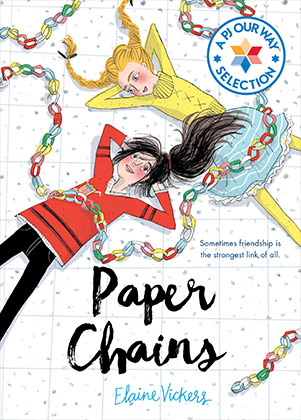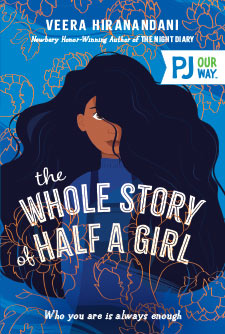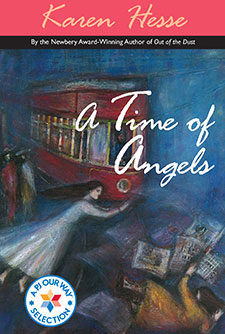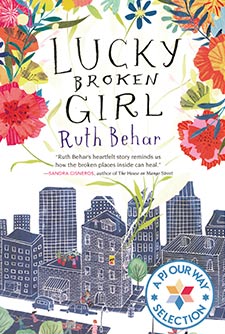Paper Chains
Ana feels like she’s the only grown-up at home. Katie wonders when her parents will stop treating her like a little kid. Then a misunderstanding threatens Ana and Katie’s friendship. Who can they count on if not each other?
Average Rating
( hint: Login to leave a review! )
119 Reviews
Leave Review
What the Book Is About
Jewish Content & Values
Positive Role Models
Content Advisory
Talk It Over
More for You
What the Book Is About
This is the story of Ana and Katie, best friends who are going through difficult transitions in their lives. Ana’s hockey player father has abandoned his family, leaving her and her brother Mikey with a depressed mom. Meanwhile, Katie struggles with her desire to learn more about her birth history without hurting her loving adoptive parents’ feelings. She feels resentful of their protectiveness regarding her congenital heart condition and wishes she could skate like the other kids. When Babushka, Ana’s witchlike grandmother, comes all the way from Russia to take charge, both girls learn much about friendship, family, responsibility, and loyalty. Told in alternating chapters, this coming-of-age story will captivate readers with its sweet and insightful message.
Jewish Content & Values
- Ana’s family is Jewish. They celebrate Hanukkah by eating latkes, lighting the menorah, and exchanging gifts.
- Ana attends services at synagogue with her Babushka and enjoys the prayers and the attention of the nice old ladies.
Positive Role Models
- Ana does her best to hold her family together after her father has left, looking out for her little brother and inspiring him to believe that good things will still happen.
- Katie matures over the course of the story as she learns to appreciate what she has and be honest about her heart condition and her past.
- Babushka begins as a gruff and witchlike figure, but she defends her grandchildren fiercely and stands by her own strict code of honor.
Content Advisory
The idea of parent abandonment is referenced throughout the book, in connection to Ana and Mikey’s dad leaving and Katie’s birth parents putting her up for adoption. The children sneak out and go to a hockey game, and Mikey gets hit hard and knocked out by skaters. He is brought to the hospital in an emotional ambulance ride and has surgery, but he recovers fully from the incident. Katie goes skating against her mother’s wishes and accidentally gets knocked down by her classmates, opening a bloody deep cut in her forehead that needs a butterfly bandage. Later, Jarek and his crew bully Mikey, calling him names and giving him a bloody nose. Ana fights back, pushing Jarek into a frozen pond.
Talk It Over
Ana lies to her brother Mikey, telling him that the hockey puck is magic. Why do you think she does this? Have you ever believed something to be true and found out later that it wasn’t? How did that make you feel?
More for You
One of the most famous Jewish adoptees was Moses, who led the Jewish slaves to freedom from Egyptian rule. Adopted by the daughter of Pharaoh after the decree against Jewish boys forced his birth mother, Yocheved, to hide him in a basket in the Nile, Moses grew up in the palace. Esther, the Jewish heroine who saved her people from certain death in Persia was adopted too, by her uncle Mordechai. Adoption and caring for orphans is strongly encouraged in Jewish tradition, and the Talmud (Sanhedrin 19b) states: “Whoever brings up an orphan it is considered as if the child had been born to him.”
What the Book Is About
What the Book Is About
This is the story of Ana and Katie, best friends who are going through difficult transitions in their lives. Ana’s hockey player father has abandoned his family, leaving her and her brother Mikey with a depressed mom. Meanwhile, Katie struggles with her desire to learn more about her birth history without hurting her loving adoptive parents’ feelings. She feels resentful of their protectiveness regarding her congenital heart condition and wishes she could skate like the other kids. When Babushka, Ana’s witchlike grandmother, comes all the way from Russia to take charge, both girls learn much about friendship, family, responsibility, and loyalty. Told in alternating chapters, this coming-of-age story will captivate readers with its sweet and insightful message.
Jewish Content & Values
Jewish Content & Values
- Ana’s family is Jewish. They celebrate Hanukkah by eating latkes, lighting the menorah, and exchanging gifts.
- Ana attends services at synagogue with her Babushka and enjoys the prayers and the attention of the nice old ladies.
Positive Role Models
Positive Role Models
- Ana does her best to hold her family together after her father has left, looking out for her little brother and inspiring him to believe that good things will still happen.
- Katie matures over the course of the story as she learns to appreciate what she has and be honest about her heart condition and her past.
- Babushka begins as a gruff and witchlike figure, but she defends her grandchildren fiercely and stands by her own strict code of honor.
Content Advisory
Content Advisory
The idea of parent abandonment is referenced throughout the book, in connection to Ana and Mikey’s dad leaving and Katie’s birth parents putting her up for adoption. The children sneak out and go to a hockey game, and Mikey gets hit hard and knocked out by skaters. He is brought to the hospital in an emotional ambulance ride and has surgery, but he recovers fully from the incident. Katie goes skating against her mother’s wishes and accidentally gets knocked down by her classmates, opening a bloody deep cut in her forehead that needs a butterfly bandage. Later, Jarek and his crew bully Mikey, calling him names and giving him a bloody nose. Ana fights back, pushing Jarek into a frozen pond.
Talk It Over
Talk It Over
Ana lies to her brother Mikey, telling him that the hockey puck is magic. Why do you think she does this? Have you ever believed something to be true and found out later that it wasn’t? How did that make you feel?
More for You
More for You
One of the most famous Jewish adoptees was Moses, who led the Jewish slaves to freedom from Egyptian rule. Adopted by the daughter of Pharaoh after the decree against Jewish boys forced his birth mother, Yocheved, to hide him in a basket in the Nile, Moses grew up in the palace. Esther, the Jewish heroine who saved her people from certain death in Persia was adopted too, by her uncle Mordechai. Adoption and caring for orphans is strongly encouraged in Jewish tradition, and the Talmud (Sanhedrin 19b) states: “Whoever brings up an orphan it is considered as if the child had been born to him.”





